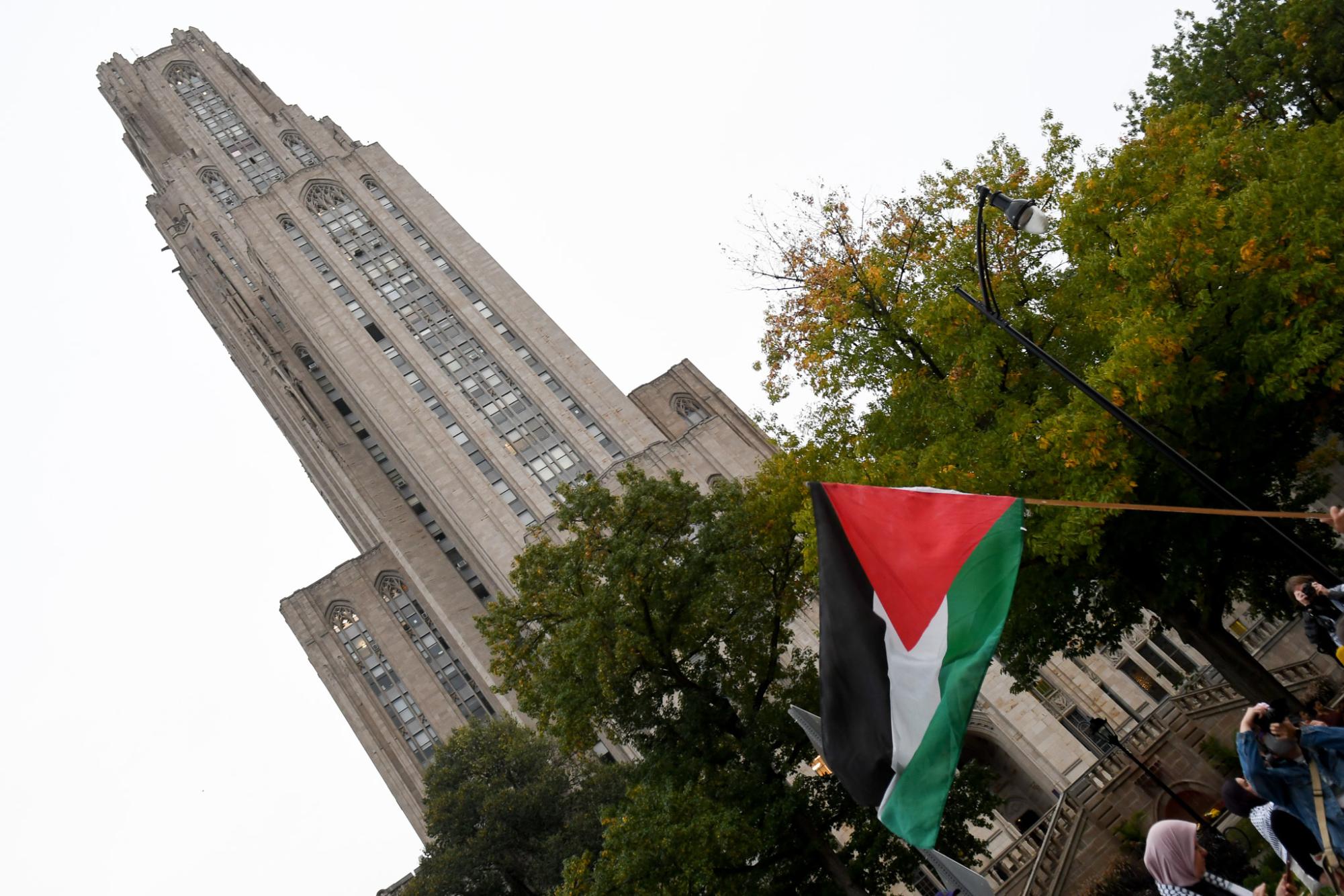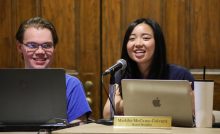Opinion | Academic institutions must address their complicity and complacency in the face of racism, Islamophobia and exclusion on campuses


A Palestinian flag in front of the Cathedral of Learning at a rally in support of Palestine on Oct. 19.
Last month, I was sent a recording of overheard hate speech on Pitt’s campus. “Just fucking mow them down, dude, by the thousands,” said a young man’s voice — he was on the phone with someone else. Julia Helou, a senior, started recording herself listening to the conversation when she heard the man repeatedly use the word “Hamas.”
Helou, who is half-Lebanese, is familiar with the near-constant conflation of Arabs and Muslims with terrorist organizations. Post-9/11, it’s not unusual to hear white Americans use “Hamas,” “ISIS” and “Al-Qaeda” to refer to entire populations. In particular, now that the U.S. Senate has smeared thousands of pro-Palestinian student groups, and the Anti-Defamation League has as well, calling them “terrorist sympathizers,” an appallingly racist and outright lie, Helou understood that this student wasn’t an exception to the rule. Someone who is gleefully talking about opening fire into a crowd and killing people “by the thousands” isn’t someone concerned with discerning and stopping terrorists. It’s someone who wants to inflict violence on anyone who reminds him of his imagined perception of a terrorist.
“It’s not like I’d be killing people,” he said, laughing. “It’s killing rats and dogs at this point.” After hearing this, Helou didn’t know what to do — she’d only overheard the man’s words because she’d been with a friend and wasn’t wearing headphones.
How many similarly vile things go unheard on Pitt’s campus, said by students who know that there is no consequence? Although Helou was aware of the level of vitriol directed toward Arabs in the U.S., the proximity and the unabashedness of this dehumanizing racism shocked her.
“I got home and my roommate’s like, ‘how are you?’ And I just broke down. … To witness someone having this extremist view, this actual wishing of death on thousands of people — how can you do that?” Helou said.
Earlier this week, a 48-year-old white man shot three 20-year-old Palestinian students in Burlington, Vermont. He saw them wearing keffiyehs and heard them speaking Arabic. Their loved ones have urged the local authorities to investigate this as a hate crime. On Nov. 27 at Brown University, President Christina Paxson was unwilling to continue her speech honoring Brown student Hisham Awartani, who sustained the most severe injuries. She cut the speech short due to the fact that Awartani’s peers were chanting for Brown University to divest from financial and military matters in Israel.
This comes after weeks of constant reports and videos of the reality of the Israeli siege on Gaza, which has killed over 15,000 Palestinians. The Israeli Defense Force’s few verified admissions respective to the latest noncivilian death toll only confirm that allegedly 150 are “Hamas operatives,” aside from the 1,500 Hamas members they claim to have killed directly after the Oct. 7th attack. They continue to not provide further information when pressed about the civilian deaths. That’s an over 99% civilian death toll in the last month. Nearly 70% of those killed were women and children. Across the country, student groups who criticize this are told they’re “sympathizing with terrorists” — set aside for a moment the fact that these organizations have stated that they do not endorse violence against Israeli civilians and actively do not support Hamas, or the racism of, again, conflating any collective of Arabs or Muslims with “terrorism.”
Is it so difficult for university administrations to recognize this loss? What about the 99% of the dead who had nothing to do with Hamas? Is grieving for them terrorism? Is mourning the loss of over 5,350 children something to apologize for? Can you explain why and maintain a shred of your dignity while doing so?
One university president cannot seem to admit the irony of holding a vigil for a student who was shot due to the discrimination they financially benefit from. Students are permitted to oppose violence, but not what has caused it.
A similar culture of silence and apathy seems present at Pitt. I want to share an anonymous statement sent to me about the Palestinian experience on our campus.
“My wife and I are both Palestinian and affiliated with the University of Pittsburgh. In the face of yet another American-sponsored massacre of our people, Pitt’s response has been, in a word, disheartening. Pitt claims to stand for academic integrity, equity, justice and supposedly to care for the well-being of its entire community.
Yet, Chancellor Gabel’s messaging thus far has failed to even mention the word ‘Palestine.’ Instead, Pitt has peddled sensationalist War-on-Terror propaganda, and its administrators have generally stonewalled anyone advocating an anti-genocide position. Given Pitt’s recent and ongoing support for Ukrainian self-determination, its hypocrisy with regards to our struggle is disturbing at best, and actively harmful at worst.
So long as Pitt silently condones the racist violence of American imperialism abroad, we will feel subjected to the ramifications of that violence here. And we already have been — my wife, a visibly Muslim woman, was verbally assaulted three weeks ago in Pittsburgh.”
In response, a University spokesperson said Pitt “remains committed to equity and inclusion for all students, faculty and staff. It also remains firmly committed to academic freedom and freedom of expression.” They noted that anyone can report a potential bias incident through Pitt Concern Connection, which can be done by phone, text or email, and has anonymous reporting options. The spokesperson did not respond to requests to clarify why the Chancellor did not explicitly condemn the Israeli government or mention Palestinian suffering in her Oct. 12 email to the Pitt community or in any following statements.
Elsewhere, Columbia is the latest institution to ban Students for Justice in Palestine and Jewish Voices for Peace on their campus. Brown arrested 20 Jewish students who were peacefully calling for a ceasefire. When we can see the reality of the occupation funded by this country, we cannot allow academic institutions to obfuscate their own role in this. We cannot look away from the pathetic, watered-down sentiments they send out and pretend that they do not reveal something about the moral character, or lack thereof, of the institution we give money to.
To continue to say that support for Palestine is antisemitic is to continue to project savagery, brutality and prejudice onto Palestinians and Arabs, and to continue silencing and denying the voices of anti-Zionist Jews. As someone lucky enough to have grown up with a wealth of anti-Zionist Jewish voices, I feel the need to reiterate that so much of my unwavering support for Palestine is informed by the courage of my Jewish peers and their thoughtful interpretation of their religion, which should never, under any circumstances, be presented as synonymous with the violence of the Israeli occupation.
Support for Palestine on college campuses is never an attack on the safety of the Jewish community, never a celebration of violence. It is a sincere belief that there is no justification for apartheid, for land theft, for torture, detentions and for the killing of 15,000 Palestinians in less than two months. It is not a call to harm Jews, never a call to incite violence. It is an expression of the desire to see Palestine’s borders restored and for everyone residing in those borders, regardless of their religion, to enjoy equal freedoms.
The fact that it is professed by thousands of Jewish activists across the world should be proof enough of that. I wonder sometimes if those who insist on calling the opposition to apartheid antisemitic really think so little of their neighbors, of their friends and family members. The Anti-Defamation League is the primary “source” of this criticism. It is worth noting that they are considered a right-wing organization likely to collaborate with law enforcement to perpetuate state violence against marginalized communities by over 100 U.S.-based progressive groups. They supported and secretly collaborated with the apartheid government in South Africa, harassed Black civil rights activists for years, and called Jewish Voices for Peace an “antisemitic hate group.”
They are responsible for the oft-cited statistic that antisemitism has increased by 400% in the last month. While any reports of antisemitism are incredibly alarming and should be taken seriously, the ADL is not an accurate or dependable source. The ADL, on top of a long and varied career of racism, skews data — they report any pro-Palestinian statement as inherently antisemitic, without regard for how much of the Jewish community they smear in doing so. That accounts for 54% of their reports. Do you really think these community members, some religious leaders, are “self-hating Jews”? Do you really think that recognizing the humanity of Palestinians can be chalked up to “confusion” or “self-hatred”?
“It’s heartbreaking,” said Samuel Weiner, a master’s student at Pitt, talking about the rejection professed by some rabbis, calling anti-Zionists “not real Jews.”
“It feels like they didn’t read the book they’re preaching,” Weiner said.
Weiner is one of the thousands of anti-Zionist progressive Jews frustrated with the manipulation of his faith to serve as justification for atrocities, and for the policing of other students and activists.
“When they say anti-Zionism is antisemitism, they are essentially saying that being anti-colonial is antisemitic now. And you can’t,” Weiner said. “That’s just using my body as a shield.”
I am disgusted by Pitt for not extending much more than the bare minimum of solidarity toward all its students in the face of enormous violence. As a student of anthropology, I am disappointed in my field’s silence. It is the nature of our discipline to analyze brutality — it is the only thing, pathetically small as it may be, that we have the authority to do. The principal value that academic institutions serve is to use these platforms and positions of authority to identify and critique hegemony as it emerges, not to look back on it when the dust has settled and profit off of posthumous analyses.
To all those unwilling to publicly oppose apartheid, understand that your silence puts so many of your students at risk, and it plays into the imperialist prejudice you are paid to discuss. I understand there may be professional or social consequences at stake here. I also understand that loneliness and reprimands, professional or otherwise, are infinitesimal prices to pay for a conscience. Now is not the time for institutions or academics to be silent, because their choice to do so will result in a shame that long outlasts the relevance of any of their publications, a shame that will render their teachings and their authority irrelevant.
Sofia Uriagereka-Herburger writes about politics and international and domestic social movements. Write to her at sou5@pitt.edu.
Recent Posts
SGB introduces new governing code bill and addresses rumors of ICE on campus
At its weekly meeting at Nordy’s Place on Tuesday, Student Government Board introduced an omnibus…
Opinion | School should be in the summer
Although this may be controversial, I believe that from this data, it is evident that…
Weathering the storm: Pittsburgh teams have tackled some of the toughest environments
The end of the year in western Pennsylvania is always marked by two things —…
Notes From an Average Girl // Notes on Book Banning
In this edition of Notes From an Average Girl, senior staff writer Madeline Milchman writes…
To Be Honest // Yup, it is that damn phone
In this edition of To Be Honest, staff writer Evin Verbrugge writes about her phone…
Meaning at the Movies | Portraying Toxic ‘Adolescence’
In this edition of Meaning at the Movies, staff writer Lauren Deaton explores the mini-series…

